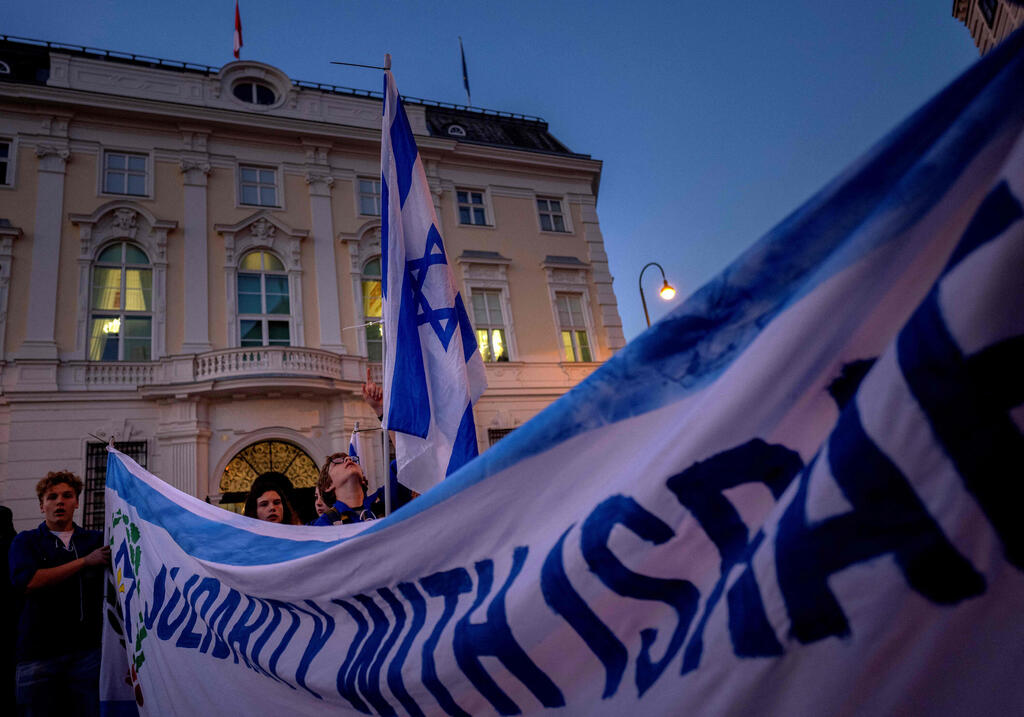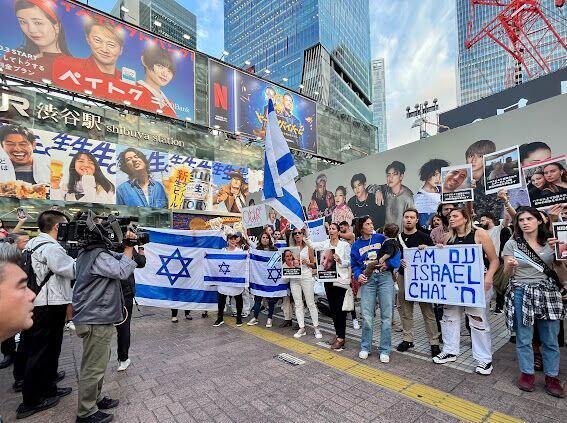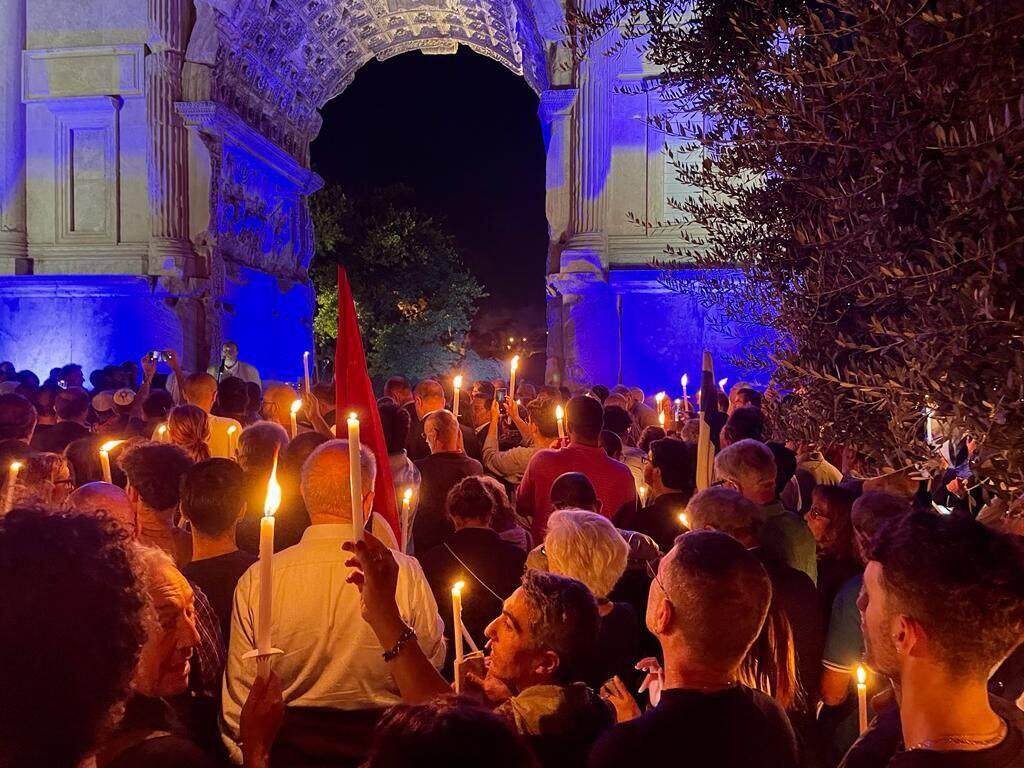Getting your Trinity Audio player ready...
Kabbalat Shabbat is solidarity with Israel around the world
(Video: Mosaic)
Alongside the lyrics of the song "L'kha Dodi," associated with the Sabbath, the special collection of prayers and songs titled "Israeli Kabalt Shabbat" includes a quote from a post by Hanoch Daum, a journalist for Yedioth Aharonoth. In this post, Daum speaks about Anat Rabin-Liberman, the head nurse of Kibbutz Nir Am, whose determination and bravery played a dramatic role in protecting and defending kibbutz residents during the attack on October 7.
More stories:
The unique collection also features the familiar Psalm "Shalom Aleichem," Leah Goldberg's song "Elohai (My Lord)," the Kiddush blessings, and Shimrit Or's song "Yachad (Together)," along with the blessing "Hamotzi" and the song "Yamim Shel Sheket (Days of Peace)" by Jordan Bar Kokhva.
The combination of prayer with a story of heroism in a collection focused on Sabbath marks a significant change in our people over the past two weeks. It is clearer than ever that we need unity, life side by side, with the holy and the mundane, with quotes from traditional sources alongside new Israeli creations
On the upcoming Shabbat, October 20-21, people all over the world will acknowledge it as a Shabbat of solidarity for the Jewish people, in support of the residents of southern Israel, the security forces, the soldiers at the borders and, of course, in prayer for the safe return of the captives and missing individuals.
This initiative is endorsed by the World Zionist Organization, the Jewish Agency, and the Ministry of Diaspora Affairs. Shabbat Welcome events will take place in hundreds of locations worldwide. In addition to the prayer and song collection, the project includes a placemat with the image of 203 soldiers of David's Shield, as the number of our captives and missing persons. Israelis and Jews around the world are asked to print and place it next to an "empty chair" symbolically reserved for the missing and captives and pray for their return.
"The Jewish Diaspora demonstrates immense support for the State of Israel and the IDF, strengthening the Israeli public and the security forces in their sacred mission," says Diaspora Affairs Minister Amichi Chikli. "There is no more appropriate moment to unite under the light of the Shabbat candles when our prayers go out to all our fighters: May the Lord bless and keep them. Together, we will prevail."
4 View gallery


Pro-Israel rally in Vienna, Austria in wake of Hamas attack
(Photo: JOE KLAMAR / AFP)
Among the many individuals working to strengthen the connection between the Diaspora and Israel is Gusty Yehoshua Braverman, the head of the Department for Organization and Connection with Israelis in the World Zionist Organization.
"The initiative to hold a global Kabalat Shabbat aims to unite every part of the Jewish people and create one strong, living human connection. Each one of us can, in their own way, connect, draw strength, find comfort, unite in deep prayer for the security of Israel, the healing of the wounded, the return of the captives, finding the missing, and the safe return of IDF soldiers to their homes. We also pray for the well-being of our brothers and sisters in the Diaspora who stand in unwavering solidarity with the State of Israel."
On Guilt and Responsibility
Tal Ventura, the central emissary of the Scout Movement and the Jewish Agency in Europe, heard the news about the war during his activities in Lisbon. "I woke up early, and the feelings were tough, full of worry and uncertainty," he says. "Later on, feelings of guilt and a sense of responsibility also set in - guilt that we're not there and responsibility to help Israel and the Jewish and Israeli communities in Europe as much as we can. Many of those living here have families and friends in Israel, some of them left to join the military, and everyone is following the news."
Ventura adds that the sense of unity he sees in Israel is also felt across the sea, in part due to the "Israeli Shabbat Welcome" initiative. All the different organizations and bodies that usually work separately have come together and opened their activities to everyone. Communities are raising funds, supporting local communities, providing explanations, and now participating in the Solidarity project, which will take place worldwide on the upcoming Shabbat.
"All of us together will mark this Shabbat in prayer for the soldiers, the people of Israel, and the Jewish communities," he shares. "We adapted the content for various target audiences in different languages, and we hope that as many people and communities as possible will participate, share an image with the hashtag 'TogetherWeWin,' and thus, we will all connect and strengthen together."
My Heart in the East
Ofer Levi-Bikin serves as the contact person for Israeli communities in Central Europe on behalf of the Department for Organization and Connection with Israelis in the World Zionist Organization. He and his wife moved to Budapest a year ago following her teaching assignment at a Jewish school in the city.
"We left three children in Israel, two of whom are in the army - one in the Northern Command and one in an active combat unit, the the other is down south with Nahal Brigade's 50th Battalion," Levi-Bikin shares. "We are concerned both personally as partners and for the many Israelis living here, most of whom are families, friends, and acquaintances in Israel. There is a large community of Israeli students here, studying medicine, veterinary medicine, psychology, and more, and they are also struggling. Some of them have friends who were killed in a terror attack, some received a draft notice, and they returned to Israel on rescue flights, while others who stayed behind are very distressed and under pressure."
As part of his activities, Levi-Bikin, along with other activists and emissaries, ensures that the community receives assistance in various areas. They organized meetings with the Deputy Ambassador, connected professionals from the field of mental health for those who wished to share and open up, and arranged community gatherings with musician David Peretz.
Additionally, they facilitated connections between Israeli students and Israeli families who hosted them for Shabbat dinners. "Now, we are preparing for the Global Shabbat Welcome," he adds. "This is another opportunity for the community to come together, share their experiences, and gather around something that is both Jewish and Israeli. We provided a booklet with a combination of reading materials, songs, blessings, and prayers, so each community can choose the content that suits them in a pluralistic and inclusive atmosphere."
Not Afraid of a Long Journey
"We are in touch with our partner organizations in the Diaspora and hear that anti-Semitism is on the rise," says Meital Tessler Shemel, director of the Israelis Area at the Jewish Agency and Yaniv Nahmias, director of the Department for Organization and Connection with Israelis in the Diaspora at the World Zionist Organization - both of whom were among the project's leaders.
"Jewish communities are experiencing this war intensely because, in the end, it is against being Jewish. We meet Jewish communities in the Diaspora, who not only raise huge sums of money but also send tons of equipment, provide outreach across borders, open their homes to refugees, and more. The entrance of Shabbat is a Jewish moment that is uncontested. The goal of the project is to seize this moment between the holy and the mundane and call it a Shabbat of unity. We want to remind everyone that the Jewish people are not afraid of a long journey."








